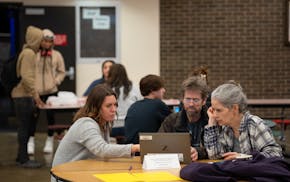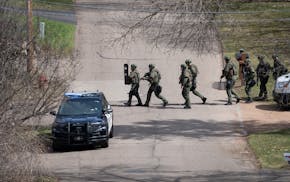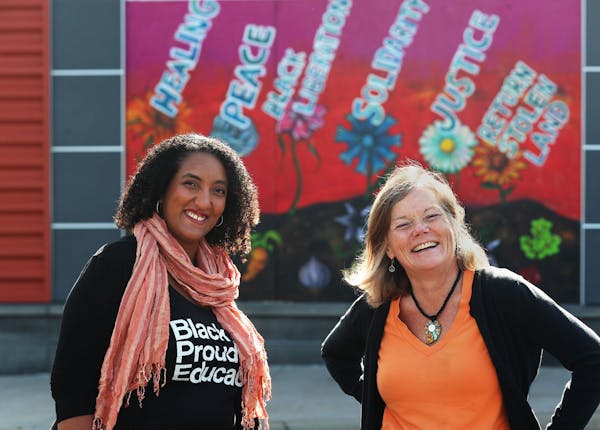Michael Robert Solomon had been training for this — the moment, he said, "when the [expletive] hits the fan."
As protests grew chaotic in the days after George Floyd died in Minneapolis police custody, Solomon, a 30-year-old New Brighton man, joined a cadre of others clad in military garb and carrying assault rifles. They deployed around small businesses and in neighborhoods around the city and braced for an onslaught.
Solomon was there on behalf of the "Boogaloo Bois," a loose-knit anti-government extremist movement that advocates armed revolution. Its adherents merge the in-person paramilitary activities of far-right militias with widespread mobilization on social media platforms such as Facebook. They appeared en masse earlier this year at gun rights protests in Virginia and at rallies against COVID-19 restrictions around the country. The Boogaloo Bois have since achieved greater prominence — and with it new law enforcement scrutiny — amid the unrest over Floyd's killing.
In Minnesota, references to the Boogaloo Bois appear throughout dozens of leaked secret state and federal law enforcement bulletins related to the late-May and early June rioting. The Star Tribune reviewed those bulletins and found Solomon singled out by name in one, which warned that he and others were armed and prepared to shoot police if they approached a Minneapolis home where they staged.
"We know we have a target [on us], that's why we don't meet up in big groups because we know we're probably going to get raided," Solomon said in an interview. "We know a lot of us are probably going to die."
In June, a man linked to the movement was charged with killing two law enforcement officers in California. Near Las Vegas, three alleged Boogaloo Bois were arrested for allegedly trying to firebomb a Black Lives Matter protest. But to date, none of the more than a dozen federal criminal cases filed in Minnesota linked to the riots mention the Boogaloo movement or other groups.
Solomon rejects any accusation linking him or the roughly 250 Boogaloo Bois he said are in Minnesota to white supremacy. At one point during the protests, Solomon was pictured raising his fist in solidarity with several Black men wearing Black Lives Matter shirts. He insists the animus of Minnesota's Boogaloo Bois is directed at the police.
The Boogaloo Bois were one of several groups from across the ideological spectrum that were closely watched by state and federal authorities during the Floyd protests, according to more than 60 private law enforcement bulletins. The documents were made available through the massive "Blue Leaks" data dump last month by a group called Distributed Denial of Secrets, a data transparency collective.
The bulletins describe a fire hose of information about who was on the ground during the May and June civil unrest. Authorities attributed the data to informants, social media and other sources. Often, they acknowledged, the intelligence was unsubstantiated.
Bruce Gordon, a spokesman for the Minnesota Department of Public Safety — which oversaw the Multi-Agency Command Center that tracked the unrest — refused to "respond to questions based on illegally obtained documents that contain law enforcement-sensitive information."
John Elder, Minneapolis Police Department spokesman, also said he could not comment, then added: "All of this remains under investigation and things are very intertwined." The FBI, meanwhile, won't comment on "specific intelligence products," said Kevin Smith, spokesman for its Minneapolis field office. However, Smith said, "the FBI routinely shares information about potential threats to better enable law enforcement to protect themselves and the communities they serve."
According to the documents, authorities raced to confirm reports that white supremacists were planning to burn Black churches in Minneapolis. Agents also tracked the movement of both local and national Black Panther activists participating in Floyd demonstrations.
Another bulletin later described motorcycle gangs capitalizing on the unrest to move increased amounts of heroin into the Twin Cities.
The files also mentioned antifa activists, citing at least one police informant warning that antifa would use "vehicle borne improvised explosive devices" to target National Guard and other law enforcement. There have been no confirmed reports of such attacks.
Correspondence among law enforcement in Minnesota reflects the growing profile of the Boogaloo Bois as unrest spread beyond the Twin Cities. Solomon also appeared on camera in a Daily Mail news report as he and others helped guard a tobacco shop.
Solomon, who manages the maintenance division for a local property management company, called himself "an armed redneck" who joined the Boogaloo movement after dabbling in right-wing conservatism, libertarianism and militia activity. The police bulletin that named Solomon noted that he had a "III%-er" militia sticker on his truck.
In an interview, Solomon said his allegiance rested with the Boogaloo movement and that he had neglected to remove the armed militia sticker. Like many Boogaloos, Solomon also said he now recants his past support for President Donald Trump. Now, Solomon views himself as an "anarcho-capitalist."
Both Solomon and experts who have tracked the movement add that it was initially miscast as an offshoot of far-right white power extremism.
"Our whole thing is, we believe in freedom and absolute liberty for everyone regardless of race, creed, sex, gender, whatever; we don't care," Solomon said.
J.J. MacNab, a fellow at the George Washington University Program on Extremism, said the confusion can distract from the movement's true beliefs and plans, particularly "accelerationism," which holds that the political order can be dismantled through increased civil disorder.
"Just because they're not white supremacists doesn't mean that they aren't antigovernment extremists wanting to take down cops and the rest of the government," MacNab said. "What they want to do is to kill cops, to kill politicians, to start chaos so that their anarcho-capitalist world can emerge. It's accelerationism. It's just not white supremacist accelerationism."
Kathleen Belew, an assistant professor of history at the University of Chicago, called the Boogaloo Bois "a new name for something that is very old," following in the footsteps of survivalist movements. It draws on some of the same paramilitary strategies deployed by other movements in trying to generate an apocalyptic war, she said, in this case against the government rather than among races.
"This movement has been carrying out paramilitary training, amassing arms, learning paramilitary tactics, appropriating military weapons and explosives and other materials," Belew said.
In Minnesota, Solomon said, Boogaloo Bois rarely gather in groups of more than 20 or 30. More common are training exercises in smaller "squads." That's what Solomon said is happening now in anticipation of another looming wave of unrest. Solomon predicts one or more of the four fired officers charged in Floyd's death will escape conviction, sparking fresh chaos.
"Round one is going to look like a trip to Disney World, and we're just trying to get ready for that," Solomon said.

FAFSA completions in Minnesota drop amid flawed efforts to update form

Wisconsin Republicans ignore governor's call to spend $125M to combat 'forever chemicals'

Man killed in Minnetonka by law enforcement started gun battle with deputies, BCA says

